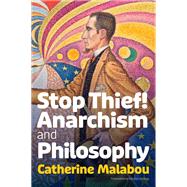
Stop Thief! Anarchism and Philosophy
by Malabou, Catherine; Shread, CarolynBuy New
Rent Textbook
Rent Digital
Used Textbook
We're Sorry
Sold Out
How Marketplace Works:
- This item is offered by an independent seller and not shipped from our warehouse
- Item details like edition and cover design may differ from our description; see seller's comments before ordering.
- Sellers much confirm and ship within two business days; otherwise, the order will be cancelled and refunded.
- Marketplace purchases cannot be returned to eCampus.com. Contact the seller directly for inquiries; if no response within two days, contact customer service.
- Additional shipping costs apply to Marketplace purchases. Review shipping costs at checkout.
Summary
In a semantic revolution, anarchists redefined anarchy not as disorder but as organization free of the “governmental prejudice.” Without this definition – taken directly from political anarchist Joseph Proudhon – none of the philosophical concepts of anarchy would have been possible.
Stop Thief! Anarchism and Philosophy calls out the plundering of anarchism by philosophy. It’s a call that is all the more resonant today as the planetary demand for an alternative political realm raises a deafening cry. It also alerts us to a new philosophical awakening. Catherine Malabou proposes to answer the cry by re-elaborating a concept of anarchy articulated around a notion of the “non-governable” far beyond an inciting of disobedience or common critiques of capitalism. Anarchism is the only way out, the only pathway that allows us to question the legitimacy of political domination and to unsettle our confidence that we need to be led if we are to survive.
Author Biography
Table of Contents
1 Surveying the Horizon
2 Dissociating Anarchism from Anarchy
3 On the Virtue of Chorus Leaders: Archy and Anarchy in Aristotle’s Politics
4 Ontological Anarchy. From Greece to the Andes: Traveling with Reiner Schürmann
5 Ethical Anarchy: The Heteronomies of Emmanuel Levinas
6 “Responsible Anarchism”: Jacques Derrida’s Drive for Power
7 Anarcheology: Michel Foucault’s Last Government
8 Profanatory Anarchy: Giorgio Agamben’s Zone
9 Staging Anarchy: Jacques Rancière Without Witnesses
Conclusion: Being an Anarchist
Notes
Index
An electronic version of this book is available through VitalSource.
This book is viewable on PC, Mac, iPhone, iPad, iPod Touch, and most smartphones.
By purchasing, you will be able to view this book online, as well as download it, for the chosen number of days.
Digital License
You are licensing a digital product for a set duration. Durations are set forth in the product description, with "Lifetime" typically meaning five (5) years of online access and permanent download to a supported device. All licenses are non-transferable.
More details can be found here.
A downloadable version of this book is available through the eCampus Reader or compatible Adobe readers.
Applications are available on iOS, Android, PC, Mac, and Windows Mobile platforms.
Please view the compatibility matrix prior to purchase.
